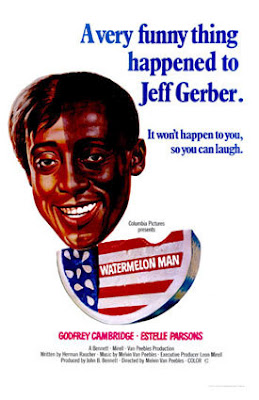
WATERMELON MAN
US, 1970, 105 minutes, Colour.
Godfrey Cambridge, Estelle Parsons.
Directed by Melvin Van Peebles.
Watermelon Man is a Negro message film, made by a black director with a black star. While it certainly shows that there is an intensity of feeling underlying the film, the intensity is not expressed solely in anger, but also in humour, sometimes sardonic and frequently quite satirical. Jeff Gerber is a white, middle-class, insurance salesman, bigot - the Mr. Average of the United States who is concerned only about himself and who is never concerned about the African American problem because blacks are generally beneath his notice. Godfrey Cambridge enjoys doing a 'take-off send-up' of this Mr. Average. And, of course, the whole first part of the film is a set-up for the time when Jeff Gerber wakes up to find himself black. From then on you could have thought up many of the sequences yourself, but probably not written them because the dialogue is quite funny and the situations are generally economic and effectively done. Raymond St.Jacques acted as a white man in black form, a District Attorney, in Change of Mind, which was interesting but far-fetched because of all the surgery - transplanting a brain. Here the changeover just happens and the film gets on with it. Effective message-satire - with a ferocious snarl at the audience in the last frame as the white bigot has finally been transformed into militant black.
1. At the beginning and the end of the film Jeff Gerber was exercising. How did his exercises contrast?
2. What kind of a white man was Gerber? How typical of the average middle class white man was he?
3. His children said he didn't want to be beaten - was this the reason for the lengthy sequence of his race with the bus?
4. Contrast the way he got on before and after the change with - his wife (TV on riots, jokes, love), children ('son of superspeed'), bus passengers (he was disliked), the bus driver (wisecracks at him), the negro in the cafe, the lift driver, the girls in the office and Erica, Mr. Townsend.
5. How effective was all the satire on his wanting to get white again?
6. Comment on his knock backs on his first run after turning black - people screaming, suspicion of theft, befriended by the bus driver. Comment also on his being kept out of the club and his wanting to start fighting at once, on the doctor putting him off.
7. Why did Althea say she was a liberal with limits?
8. The visit of the neighbours to buy him off was an obvious sequence to include. Was it handled well? What did it show about the whites, about Gerber?
9. Why did Gerber call Erica a white bigot after his encounters with her?
10. What was the nightclub sequence trying to show?
11. How moving was Althea's last phone call? Was she self-
centred?
12. The last image was Gerber's face in hostile black-power snarl. The film showed that any man treated as blacks are treated by whites in the U.S. (the songs in the background and the words on the screen satirise this) ends up being forced into black-power hostility. Is this a fair summing up of the film?
13. was the film effective because it was often funny and witty?
14. How well did the film get its message across? Did it make a significant contribution to the race question?